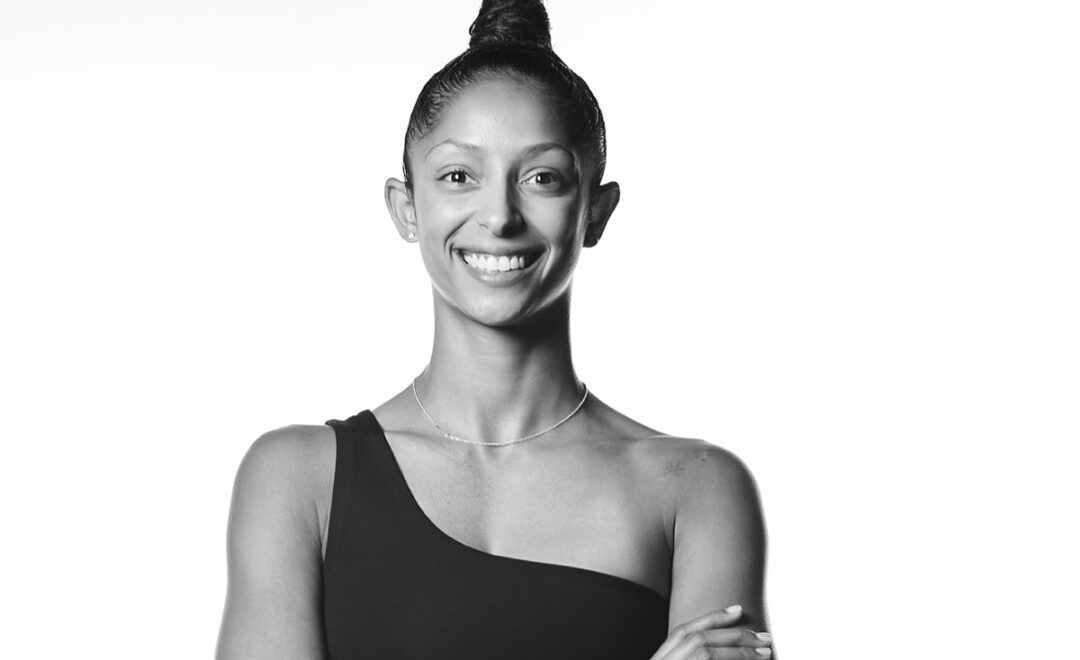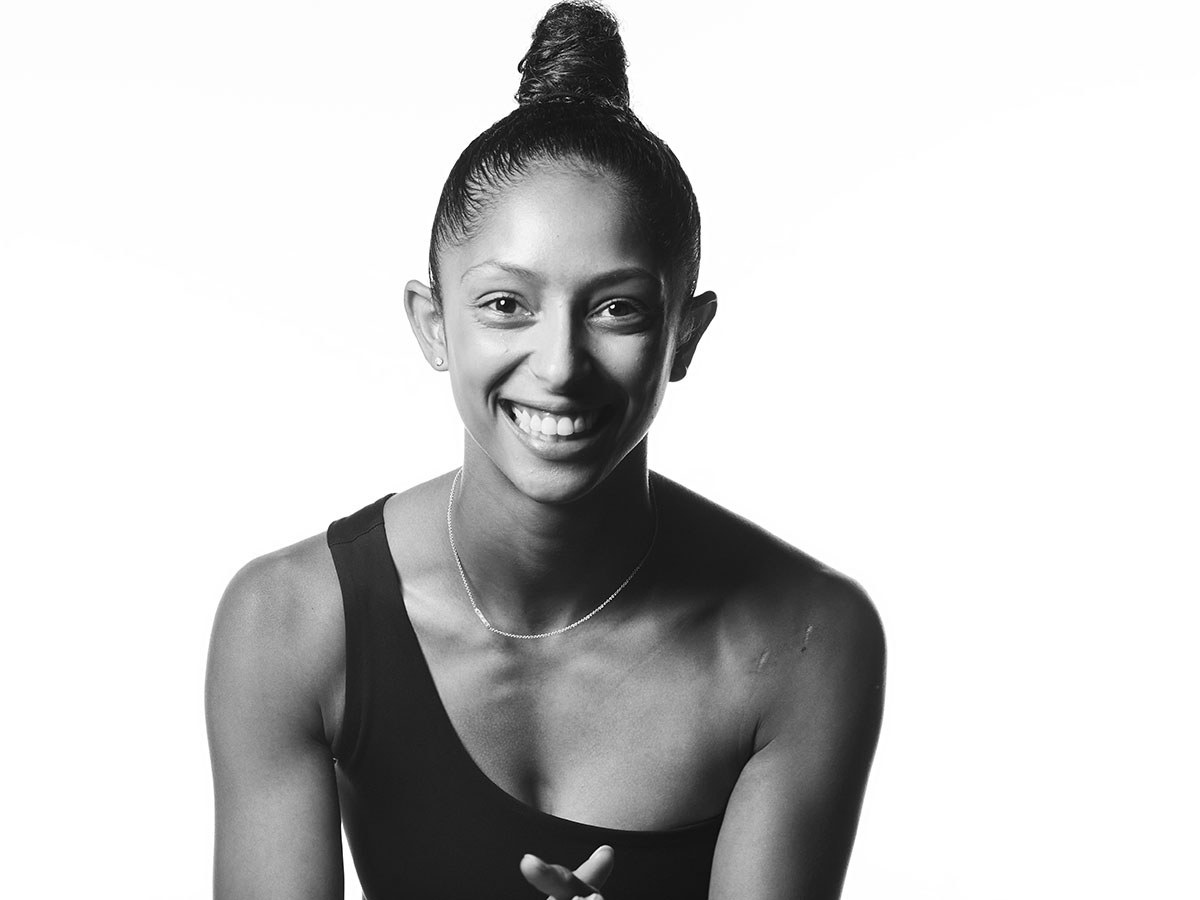Welcome your new Cut coach, Bre

Bre Henderson grew up in a household where sports were a non-negotiable. Her competitive background pushed her to excel at soccer throughout high school and into college, until an ACL tear made her question all she’d been taught.
She spent the next eight months in the pool doing rehab, adopting an entirely-new approach to training — both mentally and physically. Today, athletes know Bre for her knowledge of injury prevention and can’t-fake-it energy, which we’re excited to see on the turf.
With that, give a warm welcome to your newest Cut coach, and look for her community classes this week on the schedule.
What were you doing before Cut? How did you enter the fitness industry?
I have a background in sports, especially soccer and swimming. I competed in DI soccer for Francis Marion in South Carolina while earning my degree in biology. I didn’t know what I wanted to do with my life, but hoped to 1) help people and 2) do something with the human body.
Before my senior year of college, I tore my ACL. That injury made me hit rock bottom, but ultimately became my biggest blessing. After eight months of rehab, I had my ah-ha moment of, “What if I worked on the other side of this?” I wasn’t sure I wanted to be a physical therapist, but knew I wanted to help people with injury prevention.
When I returned to the DMV, I did clinical work at hospitals while working in boutique gyms across DC. My focus was helping clients lead a pain-free life. I believe in making sustainable changes, rather than just temporary habits. You’ll never hear me mention a “summer body,” — I’m more about the bigger picture.
How did your college injury influence your career?
My injury forced me to approach training with a different perspective. Before, I trained for competition. Now as a coach, I’m a big mental health advocate. You’ll hear me ask clients, “How are we feeling today? Where is your head at? How are we moving?”
Each day comes with its own challenges, but it’s important to find a small piece of positivity amidst the chaos. Sometimes, an athlete comes to train after a bad day, and I’ll say, “Alright, you did shit all day long, but now you’re here. I get you for one hour — how can we make you one percent better than when you started?”
Training can freak people out. It’s uncomfortable, but there’s value in getting comfortable with being uncomfortable — particularly when you have a coach or teammate in your corner.
Your injury changed your mental game — did it also change how you train physically?
I come from a family where we had to be good at sports; we had to work harder than the person next to us. That competitive mindset led to a lot of overtraining. If I’m being transparent, the day I tore my ACL I was fatigued, exhausted, and a little sick. I shouldn’t have been practicing that day, then shot the ball wrong and landed funny.
Now, I understand that how my body feels is way more important than anything else. I used to be the person who didn’t value recovery. Now, the warm-ups, recovery, mobility, and other boring shit that’s not sexy or IG-worthy is where I focus my attention.
Recently, I was doing an ab rollout and tore my labrum and dislocated my shoulder. My first thought was, “Are you ok?” quickly followed by, “Alright, now I have to demonstrate what it is to be resilient.” My mindset this time around is so different. Before, I was training to get back on the field, but now it’s an overall lifestyle. Life goes on and we simply have to do the things that pick us back up.
Did you have a mentor or coach influence your career?
When I was a freshman in high school, there was a junior who played for the U17 Trinidad and Tobago Women’s National Team. She would go to the U17 World Cup in the middle of the season, only to come home and play more games. I looked up to her because she was a captain yet always told me, “Bre, you could be so good.”
She led by example through daily affirmations. She was the first person who ever said to me, “Yo, you’re having a bad day, but we’re here, let’s do this,” or “You can do this; you’re worthy of this.” I almost signed the National Letter of Intent to go to the same university as she did. When I didn’t, I kept in touch with her throughout my college career.
I’m a self-motivated person, but some days are harder than others. In the end, it’s how we choose to respond to things — that’s what I learned from her. Control what you can control.
What’s your philosophy as a coach?

People train with me for one of two reasons. One, my energy — I genuinely give a fuck about people. I can’t “turn it on” or fake my energy. And two, I experienced kinetically what it’s like to crawl your way back from an injury.
When you’re injured, you don’t feel good about yourself — and a lot of people workout for the sole purpose of feeling better. The journey back is a long, bumpy road, but if you focus on the little things, you’ll see progress.
I’m big on praising the little things, pushing people to get eight hours of sleep, deal with stress the right way, and do recovery work. I have one client who really struggles with getting eight hours of sleep, so I’ll praise her for going to bed five minutes earlier. I believe that it’s the small things that make the big things.
Where did that mentality come from? That the ‘small things make the big things’?
College sports.
I don’t mean for this to sound cocky, but in high school I always knew how good I was. It’s not like I didn’t work hard, but I never had to fight for a starting spot.
Getting to college was a very humbling experience. I was no longer the biggest, fastest, or strongest — I was at the bottom. Suddenly, I had this realization of, “Alright, you’re going to scheduled practice, but what are you doing in the meantime? What little things are you doing to make yourself stand out?” Taking an extra ice bath, getting to the training room, asking for one-on-one time with a coach or captain — all those little things make the big things.
Throughout the next four years, I kept asking myself, “What else is going to make a difference?” I couldn’t just compete against those standing next to me — I had to compete against the girl in the mirror. By the end of my freshman year, I was getting more playing time, and soon I was starting.
What’s the biggest lesson you’ve had to learn in your career?
Learning to prioritize myself.
In this industry, it’s easy to lose yourself and pour from an empty cup. My first few jobs in the fitness industry were rough. It was a lot of hours on very little pay. Right from the beginning, I began missing meals and workouts, until I was so physically burnt out I couldn’t do it any more.
I had this moment where I asked myself, “If I’m in this position, and have this platform to encourage, teach, and educate, yet don’t prioritize myself, what am I doing?” A workout after six back-to-back clients is brutal. But I get myself in there because it’s my “me” time. If I don’t take care of myself, I’m not my best coaching self. There’s nothing better than helping someone else — but I can’t help you unless I help me, first.
What are you most excited about at Cut?
I’m excited to get back to my roots. I love being part of a team. And this team? That’s it for me. I thrive off human connection and being part of a team atmosphere. I feed off everyone else’s energy. This high-energy, kick-ass, feel-good environment made me feel at home immediately.
5 things you might not know about Bre:
- Her niece and nephew are her two favorite people
- She’s obsessed with Marvel movies, having seen them in order multiple times
- She got suspended from a middle school basketball team for riding a rolling desk across a classroom like a bobsled
- She broke her arm when she was six after falling off a scooter
- She’s superstitious about putting her right shoe on before her left